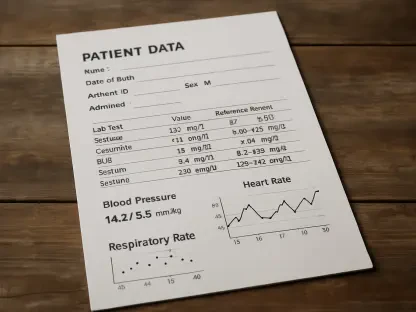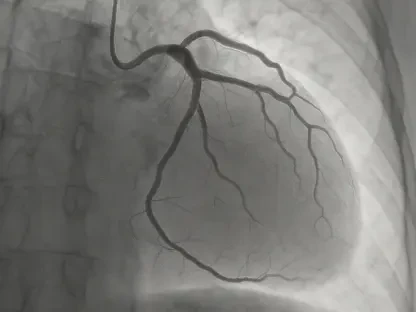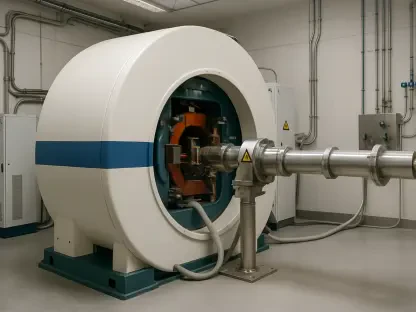Artificial intelligence, specifically through the implementation of Large Language Models (LLMs), is revolutionizing the healthcare industry in unprecedented ways. These advanced technologies are enhancing efficiency, improving diagnostic accuracy, and streamlining patient interactions. As a result, healthcare professionals can focus more on patient care while administrative burdens are significantly reduced.
Enhancing Medical Documentation
Automating Clinical Notes
One of the major transformations brought about by LLMs is the automation of clinical documentation. Healthcare professionals spend a significant amount of time on record-keeping, and AI-powered systems can now convert doctor-patient dialogues into structured electronic health records (EHRs). This automation allows physicians to dedicate more time to direct patient care. The efficiency provided by automated clinical notes is expected to alleviate the workload on healthcare professionals, making their tasks less cumbersome and time-consuming.
Furthermore, the precision and reliability of these AI-driven systems ensure that patient records are accurately maintained, reducing the chances of human error that can often lead to significant healthcare miscommunications. The added reliability of these systems enhances patient safety by optimizing documentation accuracy. Automated clinical notes serve as a significant advancement in administrative processes, ultimately leading to improved patient outcomes due to the time and care freed up by healthcare providers.
Facilitating Medical Summarization
LLMs streamline medical summarization, providing concise and essential patient data quickly. Automated systems generate summaries of medical records, presenting key information in an accessible manner to healthcare practitioners, thus improving clinical workflow and decision-making. These summaries allow clinicians to obtain the most relevant details of a patient’s medical history at a glance, making it easier to make informed decisions without wading through extensive and complex documentation. The ease of access to crucial patient information significantly assists in preventing delays that might compromise patient care.
Moreover, by distilling vast amounts of medical information into succinct summaries, healthcare professionals can enhance their diagnostic accuracy and the overall efficiency of patient management. These systems also facilitate better communication among multidisciplinary teams by ensuring that everyone has access to the same relevant information. Consequently, LLMs improve collaborative efforts in patient care, leading to more precise and effective treatment plans.
Supporting Clinical Decisions
Enhancing Diagnostic Accuracy
LLMs assist clinicians in making better diagnostic decisions by analyzing patient symptoms against vast medical databases. AI models offer evidence-based recommendations by cross-referencing medical case studies and journals, improving the accuracy of diagnoses and presenting potential conditions. The vast computational capabilities of these models allow them to process and interpret extensive amounts of data in ways that a human practitioner alone might find challenging. This ensures that even rare and complex conditions are identified with greater accuracy.
Enhancements in diagnostic precision are particularly impactful in fields such as oncology, where early and accurate diagnosis can significantly affect patient prognosis. By augmenting human expertise with AI’s data-processing capabilities, LLMs help revolutionize the landscape of diagnostics. The collaboration between human and machine intelligence leads to a symbiotic relationship where technology and human judgment complement each other.
Optimizing Treatment Plans
In addition to diagnostic support, LLMs enable the optimization of treatment plans. By evaluating patient data alongside extensive medical publications, these models provide tailored strategies for treatment that offer the best outcomes, reducing the likelihood of diagnostic errors and enhancing patient care. AI systems can evaluate vast datasets to identify patterns and correlations that might be overlooked by human clinicians, ensuring that the most effective treatment plans are proposed.
The optimization of treatment strategies is particularly crucial in dealing with chronic diseases and conditions that require ongoing management. LLMs can adapt and refine treatment protocols over time, ensuring they remain effective and responsive to patient needs. Ultimately, LLMs represent a significant advance in tailored healthcare, empowering practitioners to provide more personalized and effective care.
Revolutionizing Patient Interaction
Engaging Chatbots
AI-powered chatbots are transforming patient engagement. Available 24/7, these chatbots answer medical queries and provide guidance, reducing the workload for healthcare professionals. Patients receive instant, accurate responses, improving overall satisfaction with healthcare services. These chatbots are particularly valuable in times of emergency or after-hours when immediate professional assistance might not be readily available. They ensure that patients have access to important health-related information whenever necessary.
Chatbots are designed to handle a wide range of inquiries, from providing basic medical advice to directing patients to the appropriate healthcare services. This accessibility helps to improve patient education and empowers individuals to take proactive steps in managing their health. By reducing the dependency on direct healthcare interactions for minor inquiries, chatbots free up resources for more critical and complex healthcare needs.
Encouraging Medication Adherence
Another benefit of LLM-driven interaction is in aiding medication adherence. AI systems provide patients with reminders and dosage information, ensuring compliance with prescribed medication regimens, and fostering better health outcomes. Adherence to medication schedules is vital in managing chronic diseases and preventing complications, yet many patients struggle to follow their prescribed routines.
AI-driven reminders help mitigate non-compliance issues by regularly notifying patients of upcoming doses, offering personalized encouragement, and providing information about the importance of adherence. This guidance fosters better patient outcomes by ensuring that medications are taken as intended. Additionally, the ability of AI systems to personalize interactions effectively addresses the individual needs of each patient, leading to higher satisfaction and improved health maintenance.
Advancing Drug Discovery
Accelerating Research
LLMs significantly accelerate drug discovery and research. By analyzing vast amounts of biomedical literature, these AI tools can detect new treatment opportunities and predict drug interactions, expediting the development of new medications. The time-consuming and often laborious nature of traditional research is substantially optimized by these models, allowing for faster and more effective identification of potential drug candidates. The computational prowess of LLMs makes it possible to analyze data at a scale and speed that far outstrips human capabilities.
Furthermore, integrating AI in research helps to reduce the time required to bring new medications to market, ensuring that innovative treatments can reach patients more quickly. In doing so, LLMs not only enhance the pace of drug discovery but also contribute to making medical treatments more accessible and effective for a broader population.
Optimizing Clinical Trials
LLMs also enhance the efficiency of clinical trials. AI models assess medical records to identify ideal participants for trials, streamlining patient recruitment, and potentially reducing both the time and costs associated with bringing new treatments to market. By ensuring that trial populations are well-suited for specific studies, LLMs help to increase the reliability and validity of trial results, which is crucial for regulatory approvals.
The use of AI in optimizing clinical trials ensures that the most relevant candidates are selected, thereby improving the chances of success and minimizing potential risks. Additionally, AI models can monitor ongoing trials and provide real-time insights, allowing researchers to make timely adjustments to protocols as needed. This adaptability enhances the overall efficiency and effectiveness of clinical experimentation.
Improving Medical Imaging
Automated Image Analysis
Medical imaging is now more precise thanks to LLMs combined with computer vision technology. These AI systems autonomously analyze medical images to detect anomalies such as tumors and fractures, bolstering the diagnostic capabilities of radiologists. By applying complex algorithms and deep learning techniques, AI can identify minute details within images that might be missed by the human eye, contributing to more accurate and earlier diagnoses.
Automation in image analysis aids in the early detection of diseases, significantly impacting treatment success rates. For radiologists, this implies a powerful tool to leverage in the diagnostic process, enabling them to focus on evaluating more complex cases and optimizing their expertise. This collaboration enhances diagnostic capabilities by ensuring that the initial image analysis is thorough and comprehensive.
Streamlining Radiology Reports
LLMs expedite the generation of radiology reports. Detailed reports are produced more swiftly and accurately, enhancing the efficiency of radiological diagnostics and reducing the chances of human error, leading to better patient outcomes. The speed at which AI-driven systems can produce these reports means that patients spend less time waiting for diagnosis results, which can be crucial for conditions requiring immediate intervention.
Moreover, the precision of AI-generated reports reduces the likelihood of misinterpretation, contributing to more reliable and consistent diagnostic outcomes. The integration of AI into reporting systems thus serves as an invaluable asset in delivering accurate and timely radiology services. These advancements translate into better care for patients who can benefit from quicker and more dependable diagnostics.
Predictive Analytics for Prevention
Forecasting Disease Outbreaks
Predictive analytics powered by LLMs offer significant benefits for disease prevention. By analyzing epidemiological data, AI systems can forecast disease outbreaks, allowing healthcare providers to respond proactively and prevent health crises. These predictive models consider a multitude of variables, including environmental, sociological, and biological factors, to provide a comprehensive overview of potential public health threats.
Early warnings facilitated by AI allow for timely public health interventions, minimizing the spread and impact of infectious diseases. Health authorities can mobilize resources more effectively, implement containment measures, and provide the public with accurate information, thereby mitigating the consequences of potential outbreaks. The result is a more resilient healthcare system capable of managing population health with greater foresight.
Identifying High-Risk Patients
LLMs also help identify high-risk patients by evaluating their medical histories. This enables healthcare providers to create personalized preventive care plans, focusing on early intervention and reducing the incidence of diseases such as diabetes and heart disease. By scrutinizing extensive patient data, AI models can recognize patterns and predict individual risk factors, facilitating targeted prevention efforts.
Enabling early identification and intervention not only enhances patient health outcomes but also represents a cost-effective approach to healthcare. Preventive measures are generally less expensive and more effective in the long term compared to treatments for advanced conditions. By shifting the focus from reactive to proactive healthcare, LLMs contribute to a more sustainable and efficient healthcare system.
Conclusion
Artificial intelligence, particularly through the use of Large Language Models (LLMs), is transforming the healthcare sector in remarkable ways. These sophisticated technologies are boosting efficiency, heightening diagnostic precision, and refining patient communication processes. With these advancements, healthcare professionals can direct their attention more towards patient care while administrative tasks are greatly minimized. The incorporation of LLMs aids in the meticulous analysis of patient records, recommending personalized treatment plans, and predicting potential health issues before they become critical. This leads to more informed decision-making and better patient outcomes. Additionally, LLMs facilitate efficient handling of medical records, case histories, and appointment scheduling, reducing the workload of healthcare staff. Overall, artificial intelligence in the form of LLMs is not only enhancing the operational aspects of healthcare but also significantly improving the quality of patient care.









